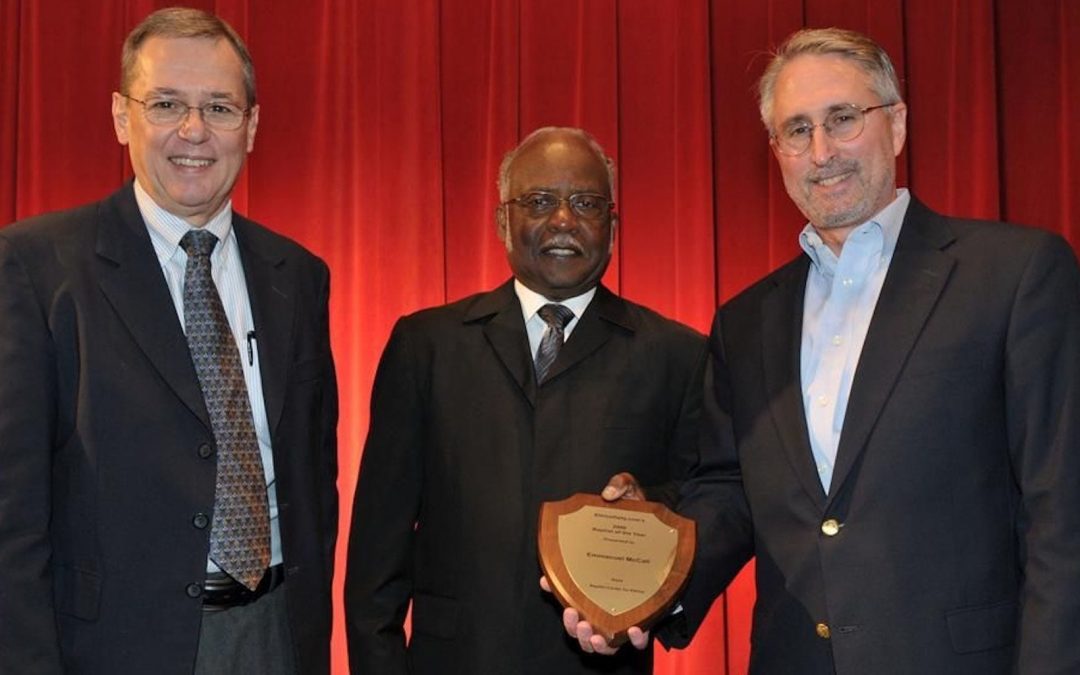Emmanuel McCall is EthicsDaily.com’s pick as Baptist of the Year for 2009.
Few Baptists have worked more constructively over a longer period of time inside the white Baptist power structure to advance racial reconciliation than McCall. He has done so with a gritty determination and an undeniable dignity. Many a good man would have understandably walked away from a people more often committed to being white southerners, than Baptists, but not McCall.
He has lived a core conviction that we are all the same—beneath the skin. That conviction is a tangible expression of his belief in the doctrine of imago dei and his ethic of imitatio Christi.
“God has made us one. We may look differently. Culture makes us respond differently. But as a mortician friend of mine says, ‘when you cut beneath the skin, it’s all the same,'” said McCall with a twinkle in his eye in a video interview.
With that observation, EthicsDaily.com found the title to its 2008 award-winning documentary—”Beneath the Skin: Baptists and Racism.”
Not only was McCall a key figure in that documentary, he has been a key figure in EthicsDaily.com’s parent organization, the Baptist Center for Ethics, and a major player in moderate Baptist life for half a century.
Before recounting his accomplishments and retelling some of his experiences, one must know two things about McCall. First was a foretelling at birth. Second was a specific call.
In his memoirs, “When All God’s Children Get Together,” McCall wrote about being named. His parents’ pastor chose a biblical name for him as an 8-day-old child—Emmanuel Lemuel—and foretold that he would one day preach. McCall never knew about that prophesy until the day of his first sermon.
If others heard McCall’s call to preach at birth, McCall heard the call to preach to a particular people.
He shared in his video interview that his decision “to work with Southern Baptists, with white Baptists in the South, grows out of a sense of call. That’s the best way I can explain it,” he said. “I accepted my call to be involved in interracial ministry like I would the calling to preach. In fact, I can’t make that separation between them.”
So explains his steadfastness to the witness and work of racial reconciliation.
When he enrolled in Southern Baptist Theological Seminary in the late 1950s, he was the only African-American student.
He recalled that ethics professor Henlee Barnette sought him out and welcomed him to campus.
The same Barnette also invited Martin Luther King in 1961 to preach in chapel and to lecture in classes.
McCall was there. He remembered the overwhelmingly white seminary audience responded affirmatively when King said, “We’re not trying to be your brother-in-law. We’re just trying to be your brother.”
Of course, brotherhood between blacks and whites was still a long way off.
In 1968, McCall became the first African-American employee at the Southern Baptist Convention’s Home Mission Board, now renamed the North American Mission Board. He worked with leading advocates for racial reconciliation, such as Will Campbell, whom many in the SBC bureaucracy considered too radical, including leaders at the convention’s moral concerns agency.
“There was a group of us, at the Home Mission Board, that were Will Campbell fans,” McCall told EthicsDaily.com. “Will was quite often involved coaching us in the interracial ministries.”
McCall said, “The things that he wanted to do that he couldn’t do, he fed us the stuff and we went out and tried to do it.”
Years later, McCall and Campbell both spoke at the Baptist Center for Ethics’ first national conference in 1992.
A founding BCE board member, McCall called for a proclamation that avoided “syrupy sentimentalism” and the “gimme God” of the TV evangelists.
He hosted several years later a BCE conference on racism at Atlanta’s Christian Fellowship Baptist Church, where he was the founding pastor, and hosted a number of board meetings at his church.
At Baptist World Alliance meetings, I’ve seen his global citizenship on display. I saw him leave, before flying back home to the United States, most of his clothing in the hotel room for the housekeeping staff in Accra, Ghana, an act of charity. I observed his comfort and curiosity while touring through Amsterdam. I witnessed his sense of fairness as chair of the Christian Ethics Commission (1995-99) and inclusiveness as chair of the Committee on Human Rights Awards (2005-09). His servant leadership was clear at the BWA’s International Summit on Baptists Against Racism and Ethnic Conflict, held in Atlanta, in January 1999.
The BWA vice president (2005-10) also became the first African-American moderator of the Cooperative Baptist Fellowship.
McCall’s lifetime of leading on race relations earns him the recognition as EthicsDaily.com’s Baptist of the Year for 2009.
Others who have received this salute include David Coffey in 2008 for his work on Christian-Muslim relationships; Al Gore in 2007 for his pro-environmental leadership; Lebanese Baptists in 2006 for their witness in a withering war; and Paul Montacute in 2005 for being a global Good Samaritan.
We, Baptists, are blessed with a great cloud of witnesses—witnesses determined to bend the arc of the moral universe toward justice.
Robert Parham is executive editor of EthicsDaily.com and executive director of its parent organization, the Baptist Center for Ethics.


